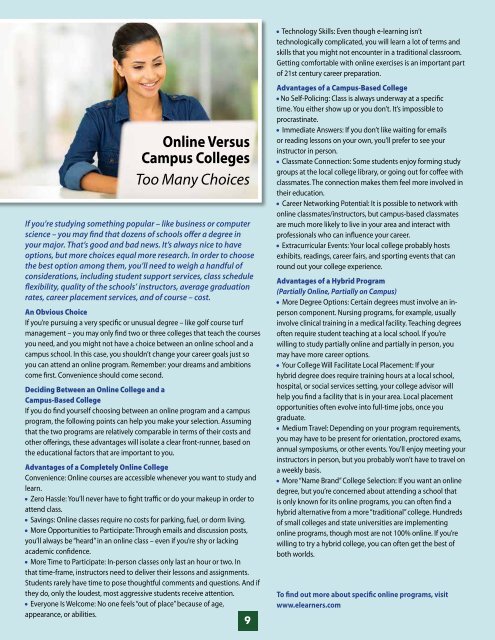49950_HSP Fall College Issue
Create successful ePaper yourself
Turn your PDF publications into a flip-book with our unique Google optimized e-Paper software.
Online Versus<br />
Campus <strong>College</strong>s<br />
Too Many Choices<br />
If you’re studying something popular – like business or computer<br />
science – you may find that dozens of schools offer a degree in<br />
your major. That’s good and bad news. It’s always nice to have<br />
options, but more choices equal more research. In order to choose<br />
the best option among them, you’ll need to weigh a handful of<br />
considerations, including student support services, class schedule<br />
flexibility, quality of the schools’ instructors, average graduation<br />
rates, career placement services, and of course – cost.<br />
An Obvious Choice<br />
If you’re pursuing a very specific or unusual degree – like golf course turf<br />
management – you may only find two or three colleges that teach the courses<br />
you need, and you might not have a choice between an online school and a<br />
campus school. In this case, you shouldn’t change your career goals just so<br />
you can attend an online program. Remember: your dreams and ambitions<br />
come first. Convenience should come second.<br />
Deciding Between an Online <strong>College</strong> and a<br />
Campus-Based <strong>College</strong><br />
If you do find yourself choosing between an online program and a campus<br />
program, the following points can help you make your selection. Assuming<br />
that the two programs are relatively comparable in terms of their costs and<br />
other offerings, these advantages will isolate a clear front-runner, based on<br />
the educational factors that are important to you.<br />
Advantages of a Completely Online <strong>College</strong><br />
Convenience: Online courses are accessible whenever you want to study and<br />
learn.<br />
• Zero Hassle: You’ll never have to fight traffic or do your makeup in order to<br />
attend class.<br />
• Savings: Online classes require no costs for parking, fuel, or dorm living.<br />
• More Opportunities to Participate: Through emails and discussion posts,<br />
you’ll always be “heard” in an online class – even if you’re shy or lacking<br />
academic confidence.<br />
• More Time to Participate: In-person classes only last an hour or two. In<br />
that time-frame, instructors need to deliver their lessons and assignments.<br />
Students rarely have time to pose thoughtful comments and questions. And if<br />
they do, only the loudest, most aggressive students receive attention.<br />
• Everyone Is Welcome: No one feels “out of place” because of age,<br />
appearance, or abilities.<br />
9<br />
• Technology Skills: Even though e-learning isn’t<br />
technologically complicated, you will learn a lot of terms and<br />
skills that you might not encounter in a traditional classroom.<br />
Getting comfortable with online exercises is an important part<br />
of 21st century career preparation.<br />
Advantages of a Campus-Based <strong>College</strong><br />
• No Self-Policing: Class is always underway at a specific<br />
time. You either show up or you don’t. It’s impossible to<br />
procrastinate.<br />
• Immediate Answers: If you don’t like waiting for emails<br />
or reading lessons on your own, you’ll prefer to see your<br />
instructor in person.<br />
• Classmate Connection: Some students enjoy forming study<br />
groups at the local college library, or going out for coffee with<br />
classmates. The connection makes them feel more involved in<br />
their education.<br />
• Career Networking Potential: It is possible to network with<br />
online classmates/instructors, but campus-based classmates<br />
are much more likely to live in your area and interact with<br />
professionals who can influence your career.<br />
• Extracurricular Events: Your local college probably hosts<br />
exhibits, readings, career fairs, and sporting events that can<br />
round out your college experience.<br />
Advantages of a Hybrid Program<br />
(Partially Online, Partially on Campus)<br />
• More Degree Options: Certain degrees must involve an inperson<br />
component. Nursing programs, for example, usually<br />
involve clinical training in a medical facility. Teaching degrees<br />
often require student teaching at a local school. If you’re<br />
willing to study partially online and partially in person, you<br />
may have more career options.<br />
• Your <strong>College</strong> Will Facilitate Local Placement: If your<br />
hybrid degree does require training hours at a local school,<br />
hospital, or social services setting, your college advisor will<br />
help you find a facility that is in your area. Local placement<br />
opportunities often evolve into full-time jobs, once you<br />
graduate.<br />
• Medium Travel: Depending on your program requirements,<br />
you may have to be present for orientation, proctored exams,<br />
annual symposiums, or other events. You’ll enjoy meeting your<br />
instructors in person, but you probably won’t have to travel on<br />
a weekly basis.<br />
• More “Name Brand” <strong>College</strong> Selection: If you want an online<br />
degree, but you’re concerned about attending a school that<br />
is only known for its online programs, you can often find a<br />
hybrid alternative from a more “traditional” college. Hundreds<br />
of small colleges and state universities are implementing<br />
online programs, though most are not 100% online. If you’re<br />
willing to try a hybrid college, you can often get the best of<br />
both worlds.<br />
To find out more about specific online programs, visit<br />
www.elearners.com


